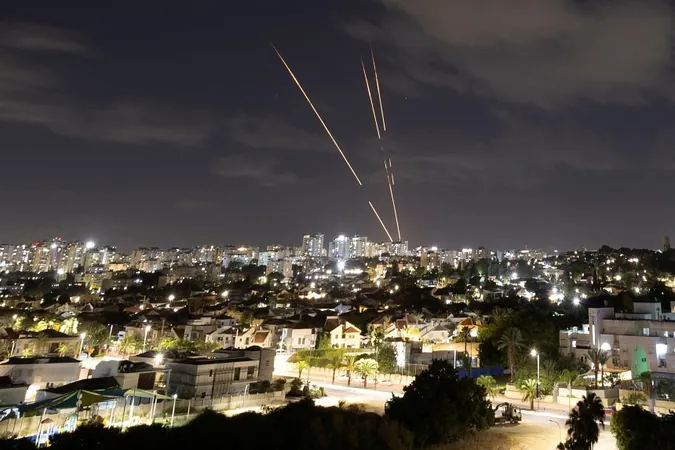
Israel's Netanyahu Vows Aggressive Response to Iran’s Missile Assault: Is War on the Horizon?
2024-10-01
Author: Yu
Intensifying Hostilities
In a dramatic escalation of hostilities, Israeli Prime Minister Benjamin Netanyahu issued a stern warning to Iran following the missile attack on Israel on October 1. While condemning the assault, Netanyahu declared, “Iran made a big mistake tonight and will pay for it. Whoever attacks us, we attack them.” His statement raises the specter of a potential all-out conflict between the two long-time adversaries.
Repercussions Promised
Israel's Defence Minister, Yoav Gallant, joined Netanyahu in promising repercussions for what he called Iran's “outrageous act of aggression.” Gallant, monitoring missile interceptions from a command center, asserted that Iran was failing to understand the consequences of its actions against Israel. He emphasized that those who threaten the Jewish state will incur “a heavy price.”
U.S. Support for Israel
The situation intensified further when U.S. Secretary of Defense Lloyd Austin stated that he had communicated with Gallant, showcasing U.S. support for Israel. Austin reaffirmed commitment to coordinated defense efforts against a barrage of nearly 200 ballistic missiles launched by Iranian forces. “We expressed mutual appreciation for our strong alliance,” he declared.
Iran's Stark Warning
In a stark warning, Iran’s military declared that any direct intervention by Israel's allies would provoke a “strong attack” against their bases and interests across the Middle East. Iranian Foreign Minister Abbas Araqchi remarked that the missile assault had concluded unless provoked further by Israeli actions. He insisted, “In that scenario, our response will be stronger and more powerful.”
Threats of Intensified Attacks
Adding to the tension, Major-General Mohammad Bagheri, Iran's chief of staff, warned that Israel's infrastructure would be targeted if attacked, stating, “The barrage will be repeated with bigger intensity and all infrastructure of the regime will be targeted.”
Geopolitical Implications
The geopolitical stakes are growing as oil prices surged 5% following these hostilities, spawning fears of a broader conflict. The UN Security Council announced an emergency meeting to discuss the spiraling tensions in the region.
Missile Attack Details
The missile attack was notable for the deployment of hypersonic Fattah missiles, with Iranian Revolutionary Guards claiming a 90% success rate in hitting their targets. Though most of the missiles were intercepted by Israeli defenses, some did manage to cause damage, notably a school in the city of Gadera, which suffered extensive destruction.
Casualties Reported
While no injuries from the missile attacks were reported in Israel, one casualty did occur in the occupied West Bank. The U.S. military confirmed that Navy warships fired interceptors at incoming Iranian missiles, showcasing the readiness of allied forces to respond to such threats.
U.S. Presidential Support
Feeling the weight of these developments, President Joe Biden assured Israel of full U.S. support, labeling Iran's attack as ultimately “ineffective.” He mentioned ongoing discussions regarding Israel's potential response and reiterated his commitment to conferring with Prime Minister Netanyahu.
Conclusion
As tensions escalate in the region, the question remains: will these threats escalate into an overwhelming conflict, and what will be the consequences for the broader Middle East? Stay tuned as this situation develops.



 Brasil (PT)
Brasil (PT)
 Canada (EN)
Canada (EN)
 Chile (ES)
Chile (ES)
 España (ES)
España (ES)
 France (FR)
France (FR)
 Hong Kong (EN)
Hong Kong (EN)
 Italia (IT)
Italia (IT)
 日本 (JA)
日本 (JA)
 Magyarország (HU)
Magyarország (HU)
 Norge (NO)
Norge (NO)
 Polska (PL)
Polska (PL)
 Schweiz (DE)
Schweiz (DE)
 Singapore (EN)
Singapore (EN)
 Sverige (SV)
Sverige (SV)
 Suomi (FI)
Suomi (FI)
 Türkiye (TR)
Türkiye (TR)